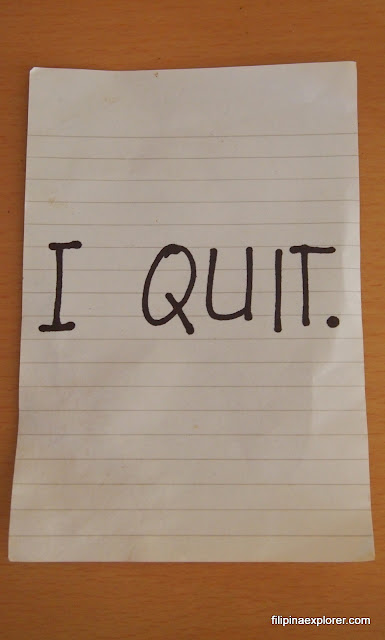If that’s true, then I’m in big trouble.
Because, guess what?
You read that right.
I quit my stable, predictable, by-salary day job as a remote lead writer for a web solutions company in order to free up more time and doors for more flexible work, freelance assignments, and – fingers crossed – passive income.
This is in the midst of the fact that I’m knee-deep in loans and mortgage payments and other miscellaneous expenses like my kid’s biweekly Kinderjoy fix.
And to make it more nerve-wracking, my boss decided to put me “on hold until further notice” a week-and-a-half earlier than my declared resignation date. That means I’m earning zero albeit still part of the company.
Naturally, when I hit the send button on that “Important: Letter of Resignation”-headed email, I was anxiety-shaken and nervous to the core. Shite. Did I just do that?
In this economy, no sane breadwinner will quit without another job waiting at the end of the line. Unlike many middle-aged parents in this country, I don’t have the security of financial support from parents if things go pear-shaped.
And honestly, I prefer it that way.
So why the hell did I just quit?!
 |
| My small “office” bunk at home. |
I loved my job. It afforded me the privilege to oversee my kid while working from 9 to 7 on weekdays, and to work freelance and embark on daytrips on weekends. I had an awesome boss.
I was earning the same bi-monthly salary as many writers were, but unlike them, I could work in my pajamas. I didn’t have to go through rigorous morning rituals just to get sweat-soaked in traffic. At least that’s how it all was in the beginning.
But by the second half of my term, my days and nights began to be filled with a counterproductive and perpetual obsession with clicking my newly company-installed tracker to check if I’ve already completed my eight-hour shift.
With an increasingly demanding toddler and ever-growing home duty calls, I was often unable to. So during weekends, if I wasn’t engaging in freelance work to augment my income, I was squeezing in unfinished tasks, pro bono for the company.
I stopped making accessories for my own shop. I almost abandoned creative writing, even blogging (which drove me nuts). I took freelance assignments less and less.
 |
| This was put on hold. |
I was working more but earning less. The loans burgeoned, but the time I had for alternative ways to pay them off was reduced.
I stopped being in love with what I do.
And it wasn’t fair to the big guys.
For the first time in my life, I surrendered to the fact that it’s impossible to wear two highly consuming hats – that of a mother and a homemaker and that of a full-time employee – simultaneously all by myself.
One of the major reasons I love working remotely is that despite being frenemies with my daughter half the time, it allows me to grow together with her. That’s a privilege not a lot of parents have.
 |
| One of the best times I’ve had the past two weeks. I haven’t played in the rain since college. so when a storm hit a couple of weeks ago, I lured my hesitant kid out to play. And she loved it. |
And physically, I was there. But I was there, often cranky and pissed at the most trivial slights. Yelling once again became the norm in the house – a habit I’m still struggling to get rid of.
It’s funny that just a year ago, I was full of enthusiasm about working like a horse. I finally gave up two years of full-time freelancing, tired of hustling for work and chasing down clients for delayed invoices.
There was a three-month slow period before I got the lead writer job, so I know quite well about “teetering on the financial brink” and working without security.
But I know well too that in life, security alone isn’t sufficient to live blissfully. My income usually survived us, but if you’re aiming for more than just survival, you have to pull the trigger and stop living solely for an intangible tomorrow.
You have to make time for other things that serve as the driving force for tomorrow, like our children. And personal dreams.
 |
| Goals and dreams in my bucket. |
What I Learned From Writing As A Career (And What Every Aspiring Freelance Writer Should Know)
When you open your world to what the world can truly offer instead of entertaining apprehensions, the world also opens up to you.
But of course, I will not make that mistake again of relying on mere freelance work, especially in this very fragile time. It’s perhaps one of those crucial mistakes many writers – including me – make as they try to get the ball rolling.
For the past four years that I’ve been writing for work, I’ve learned that if you want to succeed in this industry, especially as a freelancer:
1. You can’t fund dreams by accepting peanuts.
It drowns your soul. It lets you think you’re not good enough to earn $40 for a 500-word article. And when you’re busy hustling for work just to pay the bills, you’re not out there looking for serious clients who are willing to pay you for what you’re worth.
It puts you in a neverending cycle of getting the same assignments to put food on the table. And yes, it can for now, but what happens to your family if disaster strikes?
 |
| This is one of those self-motivating notes I try to remind myself of when I’m working and tired… |
2. You have to LOLM – live on last month.
For some people (like me), aiming for six months worth of savings is like trying to track a unicorn. It’s good financial advice, but when it’s not possible (for now, at least), a smart and more realistic tip I got from a successful freelancer is to live on last month’s pay.
Don’t count on salary and client payments that aren’t billed yet. Your expenses today should be drawn from last month’s income. It’s the only way to build an emergency fund if you’re too broke -without letting go of your writing dream.
3. Aim to build passive income.
Active income like wages, salaries and payments from clients pay the bills, but if you stop working, the money stops coming in too. What if you fell sick or got into an accident, or God forbid, passed away?
Passive income is income earned even after you stop working, including book royalties, ebook sales, apps, and website ads. Apart from having a reliable source of active income that allows for greater mobility and flexibility, this is one of my targets moving forward.
4. Time is money. What gets your attention gets money.
I’m talking about time-sucking activities like scrolling nonstop through your Facebook feed. It’s a bad habit I’m trying to get rid of (apart from checking my email too often), because that time is better spent on finding new clients or pitching to editors.
 |
| …and here’s another to prevent me from spending too much time on Facebook. |
5. There will ALWAYS be a slow or dry period. Accept it. Prepare in advance.
Days when freelance assignment are raining like biblical manna is bliss. But trust me, there will always be a point when there seems to be no work (or clients) available. Before that happens, have something to back you up.
One word: savings.
Another great tip, which I got from Living the Dream, is to have a secret jar. This is a jar that you put a nominal amount into every day for personal funding (e.g. travel funds) or emergencies then stash away somewhere not obvious (out of sight, out of mind).
This is aside from the usual piggy bank you have at home.
And unless it’s emergent in nature, don’t “borrow” from your secret jar!
6. Get rid of your debts slowly and surely.
Debts are hard to get rid of. Paying them is one of the reasons why some freelancers content themselves with peanut pay. I speak from experience.
It grows into a cycle of borrowing and patching up other debts with more debt, with interests that kill your savings faster than E.L. James got burned in her #AskELJames Twitter sesh.
7. Have faith that you’ll make it.
It will be a rough ride. But nothing good ever comes easy, yes?
Here’s the Happy Part
Luckily, over the years, I’ve built a solid client base who isn’t only willing to offer freelance work, but also catch me if I’m up for constant, fixed rate work (with decent pay) that I can complete on my own time.
But even luckier, a couple of weeks after I handed over my resignation, I had an interview with a company requiring a constant stream of articles, minus the tracking system.
More freelance work – and I don’t mean those $5-per article jobs that plague Odesk – began to spring.
The icing on the cake though is the greater amount of time I can now share with my daughter. She had her first “intentional” play in the rain with me. We visited playgrounds. We polished each other’s nails.
 |
| Her first manicurista job. She’s an ace at it. |
These are those small, happy moments I wouldn’t be able to enjoy if I kept chasing a 12am deadline for my tracker and filling my weekends up with ceaseless crazy work to finish delays and compensate for income losses.
The past week I’ve been rebuilding my vision board. I put together a collage of my greatest loves on a corkboard in my “home office”: my daughter, traveling, and writing.
Being debt-free. Visiting all 7 continents. Building a retirement fund and Lia’s life savings by 45. Doing a major climb with her. Iceland. Publishing my own book. Spending more time for creative work.
I look at all of ’em and smile, filled with renewed hope. These are things that are worth pulling the trigger for.
P.S – So, yes, you’ll be seeing more of me and Lia here. Again. Poor you. LOL.



